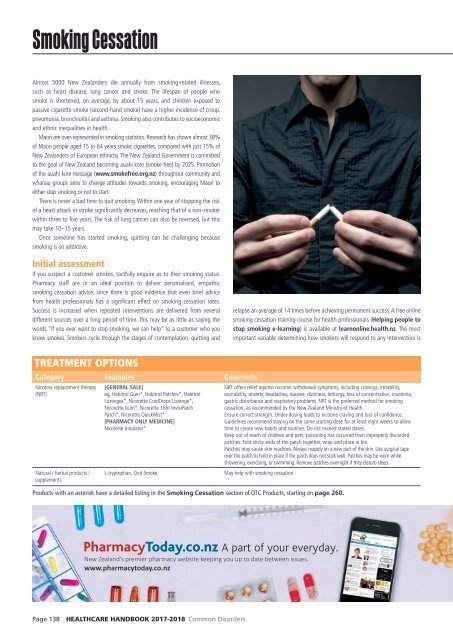2017 HCHB_digital
Create successful ePaper yourself
Turn your PDF publications into a flip-book with our unique Google optimized e-Paper software.
Smoking Cessation<br />
Almost 5000 New Zealanders die annually from smoking-related illnesses,<br />
such as heart disease, lung cancer and stroke. The lifespan of people who<br />
smoke is shortened, on average, by about 15 years, and children exposed to<br />
passive cigarette smoke (second-hand smoke) have a higher incidence of croup,<br />
pneumonia, bronchiolitis and asthma. Smoking also contributes to socioeconomic<br />
and ethnic inequalities in health.<br />
Maori are over-represented in smoking statistics. Research has shown almost 38%<br />
of Maori people aged 15 to 64 years smoke cigarettes, compared with just 15% of<br />
New Zealanders of European ethnicity. The New Zealand Government is committed<br />
to the goal of New Zealand becoming auahi kore (smoke-free) by 2025. Promotion<br />
of the auahi kore message (www.smokefree.org.nz) throughout community and<br />
whanau groups aims to change attitudes towards smoking, encouraging Maori to<br />
either stop smoking or not to start.<br />
There is never a bad time to quit smoking. Within one year of stopping the risk<br />
of a heart attack or stroke significantly decreases, reaching that of a non-smoker<br />
within three to five years. The risk of lung cancer can also be reversed, but this<br />
may take 10–15 years.<br />
Once someone has started smoking, quitting can be challenging because<br />
smoking is so addictive.<br />
Initial assessment<br />
If you suspect a customer smokes, tactfully enquire as to their smoking status.<br />
Pharmacy staff are in an ideal position to deliver personalised, empathic<br />
smoking cessation advice, since there is good evidence that even brief advice<br />
from health professionals has a significant effect on smoking cessation rates.<br />
Success is increased when repeated interventions are delivered from several<br />
different sources over a long period of time. This may be as little as saying the<br />
words “If you ever want to stop smoking, we can help” to a customer who you<br />
know smokes. Smokers cycle through the stages of contemplation, quitting and<br />
relapse an average of 14 times before achieving permanent success. A free online<br />
smoking cessation training course for health professionals (Helping people to<br />
stop smoking e-learning) is available at learnonline.health.nz. The most<br />
important variable determining how smokers will respond to any intervention is<br />
TREATMENT OPTIONS<br />
Category Examples Comments<br />
Nicotine replacement therapy<br />
(NRT)<br />
Natural / herbal products /<br />
supplements<br />
[GENERAL SALE]<br />
eg, Habitrol Gum*, Habitrol Patches*, Habitrol<br />
Lozenges*, Nicorette CoolDrops Lozenge*,<br />
Nicorette Gum*, Nicorette 16hr InvisiPatch<br />
Patch*, Nicorette QuickMist*<br />
[PHARMACY ONLY MEDICINE]<br />
Nicorette Inhalator*<br />
L-tryptophan, Quit Smoke<br />
NRT offers relief against nicotine withdrawal symptoms, including cravings, irritability,<br />
excitability, anxiety, headaches, nausea, dizziness, lethargy, loss of concentration, insomnia,<br />
gastric disturbance and respiratory problems. NRT is the preferred method for smoking<br />
cessation, as recommended by the New Zealand Ministry of Health.<br />
Ensure correct strength. Under-dosing leads to nicotine craving and loss of confidence.<br />
Guidelines recommend staying on the same starting dose for at least eight weeks to allow<br />
time to create new habits and routines. Do not exceed stated doses.<br />
Keep out of reach of children and pets; poisoning has occurred from improperly discarded<br />
patches. Fold sticky ends of the patch together, wrap and place in bin.<br />
Patches may cause skin reactions. Always reapply on a new part of the skin. Use surgical tape<br />
over the patch to hold in place if the patch does not stick well. Patches may be worn while<br />
showering, exercising, or swimming. Remove patches overnight if they disturb sleep.<br />
May help with smoking cessation.<br />
Products with an asterisk have a detailed listing in the Smoking Cessation section of OTC Products, starting on page 260.<br />
PharmacyToday.co.nz A part of your everyday.<br />
New Zealand’s premier pharmacy website keeping you up to date between issues.<br />
www.pharmacytoday.co.nz<br />
Page 138 HEALTHCARE HANDBOOK <strong>2017</strong>-2018 Common Disorders



